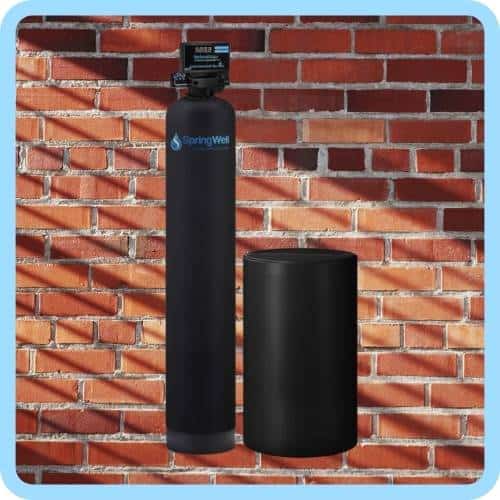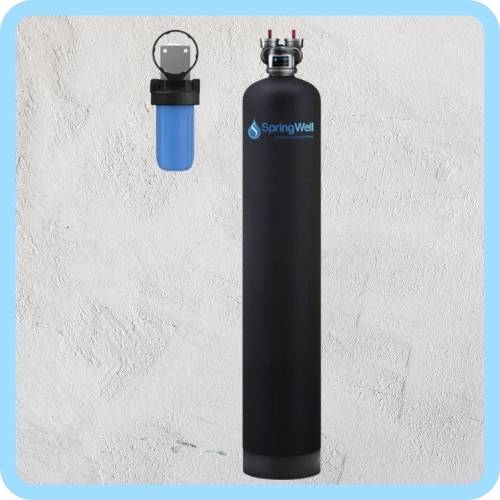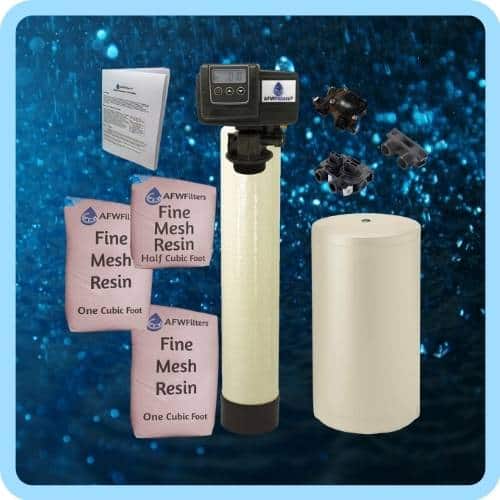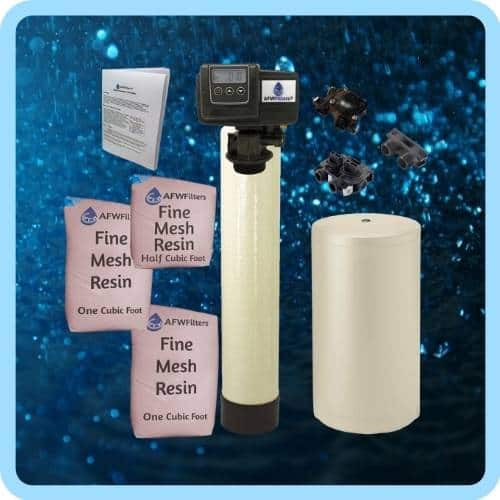In a hurry? Check out our top three…
There are various types of water softeners for well water. From salt-based to salt-free softeners, there are plenty of options to choose from.
Our top two water softeners for well water are both made by SpringWell. If you’re looking for a salt-based system go with the SpringWell Salt Based Water Softener System.
For a salt-free option, we recommend the SpringWell Futuresoft Salt-free Water Softener.
Hard well water typically also comes with other contaminants and heavy metals. This is why the water softener of your choice needs to deal with multiple problems at once. A good water softening unit removes magnesium and calcium to soften water. It may also include a filter add-on to eliminate heavy metals, chlorine, pesticides, and other chemicals.
The best softeners for wells
- Best Salt-Based Softener: SpringWell Salt-Based Water Softener System
(Bluetooth control, models to suit all home sizes & hardness levels )
> See Review
- Best Salt-Free Softener: SpringWell Futuresoft Salt-free Water Softener
(For sensitive skin, better water-feel, no wastewater ) > See Review
- Best Softner System for Iron: AFW Filters Iron Pro 2 Combination Water Softener (Low-cost, includes an iron filter) > See Review
- Best budget salt-free softener: Aquasana Rhino
(Cheap, salt-free option, no electricity required) > See Review
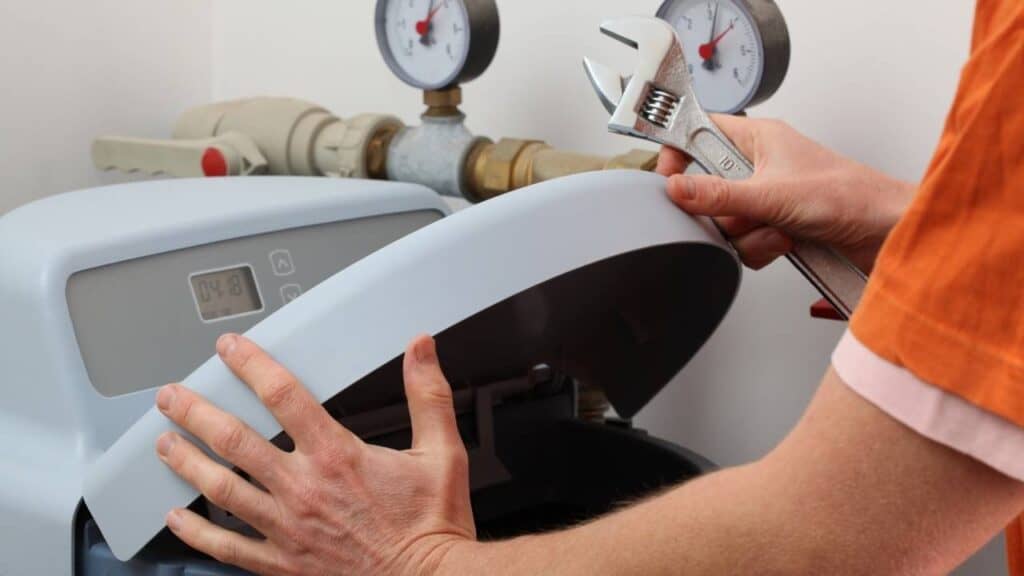
Four Best Water Softener Systems for Well Water
The following water softeners are all perfect to be installed at home. If you’re confident with DIY you can install them yourself. . They require little maintenance apart from occasional filter changes. Here’s what they are best known for.
SpringWell Salt Based Water Softener System
Best salt-based
- Price $$$$$
- Capacity 80.000 grains
- Type salt-based
- Flow rate 20 GPM
- Dimensions 63” with head
WIth a massive flow rate of up to 20 GPM and a capacity of 80.000 grains, this water softener is ideal for large homes. It’s used for families of 4-7 members or households with more than 7 bathrooms.
The water softener is also available in low-flow rate alternatives for smaller homes. You can get the SpringWell Water Softener with 11 GPM and 13 GPM. These alternatives work with homes with 3 bathrooms up to homes with up to 6 bathrooms. It’ll also save you some money if you only need one of the smaller options.
SpringWell has a great reputation for all things water and there are a few things that set this water softener apart from its rivals. As well as the high flow rate, it’s also easy to use. A digital Bluetooth control valve makes it user-friendly, especially for those beginners. This small computer offers clear measurements of used water and softened water indicators.
The water softening unit comes with a large tank. It’s ideal for homes with hard water levels other basic softeners can’t handle. Based on an ion exchange process, it protects plumbing and water household appliances.
This water softener can improve the performance of large appliances. Washers and other appliances can suffer from hard water. This is why it makes washers work with less detergent. It also prevents limescale buildup on features such as showers or faucets.
Installing the water softener is not complicated. Detailed guides for DIY installation are offered by SpringWell. This allows users to save money instead of paying for plumbing services. But if you’re not confident, this is an inexpensive and routine job for a plumber.
A Lifetime warranty is offered by SpringWell. But users need to install the water softener according to the manufacturer’s instructions for the warranty to be valid. This enables the long warranty policy.
SpringWell Futuresoft Salt-free Water Softener
Best salt-free water softener
- Price $$$$$
- Type salt-free
- Flow rate 20 GPM
- Dimensions 58” with head
SpringWell created this innovative water softener with a technology that uses no salt. This is the best salt-free water system on our list. It’s recommended for people who find salt-based systems irritate their skin. And it also requires much less maintenance and requires no electricity. There’s also no wastewater, so you’ll be protecting the environment by not discharging saltwater into the drain.
The system doesn’t eliminate minerals, it crystallizes them using a process known as Template Assisted Crystallization (TAC). This process is usually referred to as a ‘water conditioner’ or a ‘water treatment system’ rather than a ‘water softener.’ This means there is no brine tank like on traditional softeners.
This doesn’t eliminate them, but it prevents these minerals from sticking to surfaces.
The crystallization process switches hard minerals to hard crystals. It essentially protects all water appliances in the house.
This salt-free water softener is available in 3 options with various flow rates. The best option comes with a 20 GPM flow rate, ideal for large homes with multiple bathrooms.
Its high water pressure ranks it above its competitor. Many of its rivals only offer water softeners with up to a 7 GPM flow rate.
Useful for new and old homes, the water softener makes the water feel differently than a salt-based softener. Salt-based water softeners often make the water feel a bit slippery. As there’s no salt tank, you can avoid that slimy feeling with a salt-free version.
Water testing is required before installing the softening system.
Correct installation and proven levels of copper below 1.30 mg/L are a must if you want to benefit from the lifetime warranty of the softener.
AFW Filters Iron Pro 2 Combination Water Softener
Best for iron
- Price $$$
- Capacity 64.000 grains
- Type Salt-based with fine mesh resin
- Flow rate 16 GPM
- Dimensions 52 x 12 x 12 inches
If you have iron-contaminated well water that’s also hard, then the AFW filters Iron Pro 2 is the best water softener we could find. It uses fine mesh resin which removes iron from your water, which other systems are not capable of.
Resin filtration is different from ion exchange or mineral crystallization. Resins represent a type of fine plastic that resembles polystyrene. It filters out iron and manganese while it softens water at the same time.
The installation of this water softening system us easy. Most DIY users say it is installed in about 1-1.5 hours if you simply replace an old water softener.
The performance of the water softener is good as well. Users say it offers ½ grain of hardness after tests. This comes with various benefits. First, water tastes cleaner and better. But the soft water also makes sinks and bathtubs look cleaner and better. Some people also say soft water from the AFW filter & softener combo makes clear ice when using an ice maker refrigerator. Furthermore, it acts for iron removal as a complex well water filtration system.
Useful for those who have well water, the water softener is also a bit more affordable than others. Making it a good alternative to some premium water softening systems. Further savings are possible with DIY installation.
There are small drawbacks to consider for its higher affordability. For example, users mention its high weight (95lbs).
You will need a bit of help carrying it to hard-to-reach locations. This typically involves taking it down the stairs to the basement. So make sure there’ll be someone around to help you!
Aquasana Rhino

Best budget salt free
- Price $$$
- Capacity 600000
- Type salt-free
- Flow rate 12 GPM
- Dimensions 20 x 10 x 48 inches
The Aquasana Rhino is a great alternative for a salt-free water softener if you’re on a budget. As it can be bought for around half the price of the SpringWell. Efficient in softening water, this filter is normally used in small homes. The water softener is energy-efficient. It requires no maintenance and it needs no electricity to run. No drainage is needed either.
The filtration system eliminates hard water and almost all chlorine. Its salt-free filtering is also efficient at reducing heavy metals. Some of these heavy metals are responsible for calcium buildup.
Pesticides and herbicides are also filtered while turning hard water into soft water. This can come in handy, especially if you live in remote areas where well water is the main source of water.
All of these chemicals and chlorine are dangerous to your health. They are responsible for dry skin and stomach upset, among other health concerns. Aquasana delivers on these promises. As long as you don’t have more than 1 bathroom water usage this can be the water softening unit to consider.
There’s a pre-filter included, which needs changing every two months. Fortunately, these are available inexpensively in packs of four, directly from Aquasana.
Most users agree these salt-free water conditioners are efficient. Water is reported to be clearer and tastier. Soft water is also healthier. Yet, these salt-free water softeners have some drawbacks, even if these are rather small. Some users say filter fittings could be improved by being made from brass. These fittings are made from plastic and they aren’t the most durable with frequent changes.
What is Hard Water?
The terms ‘hard water’ and ‘soft water’ are often heard when it comes to washing machines and calcium carbonate buildup. But what is hard water?
Hard water is a type of water rich in minerals and chemicals. Calcium and magnesium are present in high amounts in hard water as opposed to sodium or salt in soft water.
Hard water is formed through the evaporation of oceanic water. Rich in minerals, this water ends up back in water supplies through the rain. It also collects rock sediments as it goes through the ground during the natural water cycle [1]
Hard water looks exactly like soft water. It has a clear nature, sometimes as clear as possible. But its mineral content is still there.
How can you determine if you have hard water in your home? The easiest method of discovering hard water is by testing your home’s water. High levels of calcium and magnesium would confirm hard water flows in your home’s plumbing.
How to visually identify hard water?
Hard water can be identified visually without testing, especially in the long term. If you have hard water, you’ll notice signs such as limescale buildup on the showerhead. Orange sink coloration can also indicate the presence of heavy metals in the water [2]. Both heavy metals and high levels of calcium and magnesium can sometimes be found in hard water.
Determining the water quality in your home is essential for healthy living. A quick visual inspection can also indicate hard water problems around the house. Here’s what to inspect.
Calcium buildup
Calcium buildup is characteristic of faucets, showerheads, and piping in general. It’s a clear indication of hard water.
You can eliminate calcium buildup only when hard water is turned into soft water. This is possible when using a water softening unit.
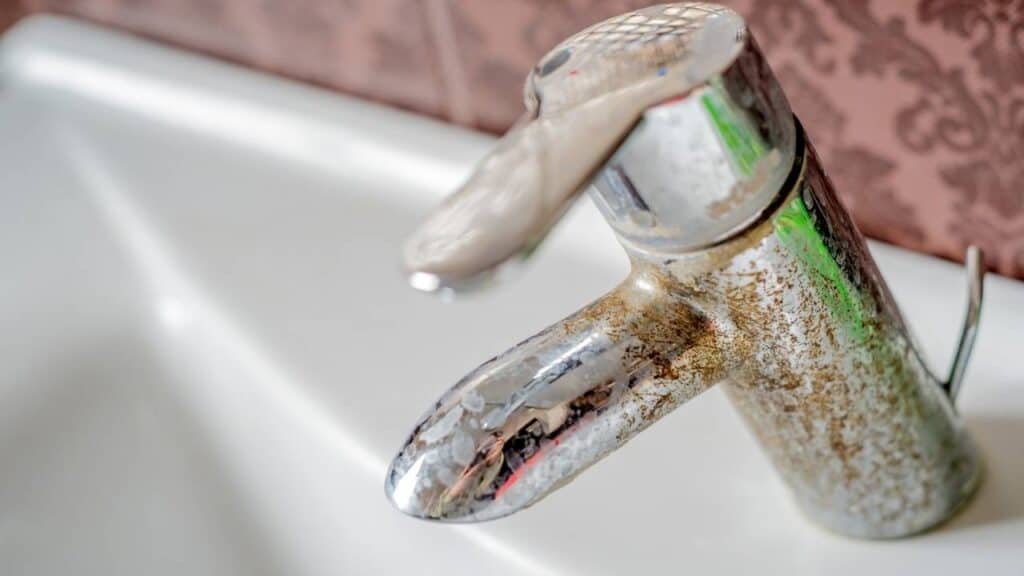
Spots on cooking utensils
Mineral spots on glasses or dishes are an indication of possible hard water presence. You can check the glasses’ cleanliness after taking them out of the dishwasher for possible mineral spots.
Clothing stains
White clothing stains represent another indication of possible hard water presence. Stained clothes out of the washing machine can be the result of hard water.
Reduced water pressure
Continuous calcium buildup can block or partially block pipes. Water levels should be checked whenever a low flow
Hard water problems
Hard water has mixed scientific benefits or drawbacks. Some studies focus on its positive effects on health through mineral content. Other studies show potential side effects of drinking hard water.
Here’s when drinking hard water is good
Hard water can sometimes come with more than 12 % of the daily recommended magnesium intake [3]. It can have a balancing role in general health. Too much magnesium in the body is rare as it’s typically excreted by the body.
Here’s when drinking hard water is detrimental to health
Drinking water with minerals can be beneficial. Constant exposure to hard water has some negative effects as well. Incipient studies in this field show hard water may cause flare-ups of eczema [4]. The skin condition isn’t dangerous, but it can be caused by hard water.
Male reproductive health might also be negatively influenced by drinking hard water regularly [5]. It’s the high calcium content that some studies show to be problematic in male fertility.
Science doesn’t have a clear range for the water hardness in health effects. There’s no minimum or maximum range that science is clear about for hard water benefits or risks.
How to test for hard water
Water can be tested for mineral content. Hard water testing methods vary from simple to complex laboratory tests.
How hard water is measured
Water hardness is measured in grains per gallon [6], milligrams per gallon, or parts per million. The most common measurement is in grains per gallon. Water hardness measured in grains per gallon is classified as follows.
Soft water – up to 1 grain per gallon
Slightly hard water – 1 to 3.5 grains per gallon
Moderately hard water – 3.5 to 7.0 grains per gallon
Hard water – 7.0 to 10.5 grains per gallon
Very hard water – 10.5+ grains per gallon
These are general guidelines for hard water, typically analyzed by lab tests. But there are many methods of determining water hardness.
Consider asking the local water supplier
If your water comes from a local municipality water quality association you can ask for hardness results. The local water supplier analyzes water daily which means this data is available.
The liquid soap test
Liquid soap tends to create bubbles in soft water. You can fill a bottle of water almost completely and add liquid soap to it. After shaking the bottle these bubbles should be visible. If there are no bubbles it’s an indication of hard water.
A water testing kit
Water testing kits are available at various prices. Some offer reliable results while others offer inconclusive results. Using a water testing kit can indicate possible hard water. You can send water samples to a testing laboratory if it turns out it has a grains per gallon level higher than 7 for confirmation.
Types of Water Softeners
Hard water can be turned into slightly hard water or soft water with a special water softening unit.
Salt-based
A salt-based water softening system is popular due to its efficiency. A house water softener system uses salt and resins from the resin tank to attract minerals. Ion exchange between calcium and magnesium on one hand and sodium on another hand is its purpose.
These brine tank salt-based systems can require manual salt-level checks. They can also be fully automatic signaling the user whenever salt needs to be added. Since salt is inexpensive this is one of the cheapest methods of treating hard water at home for the entire house.
Salt-based water filters also have their drawbacks. For example, they don’t remove other chemicals in the water. Salt-based filtering might be insufficient for well water with chemicals and bacteria.
Salt-free
Salt-free water softening units only neutralize hard water, without actually removing the minerals. These filters stop the minerals from sticking together. They essentially eliminate the impact of hard water on pipes and plumbing.
Salt-free water systems don’t require any salt or as much maintenance. So you don’t need to check the salt levels.
The biggest challenge for these units is understanding their action fully. They don’t remove hard minerals, they only remove the effects of hard minerals on pipes and faucets.
Electronic & magnetic descalers
Similar action as in salt-free water filters is seen in electronic or magnetic descalers. Electricity stops minerals from bonding which stops the negative impact of hard water.
Since they are rather new these filters aren’t as popular as others at the moment. But their biggest drawback is they don’t remove calcium and magnesium from hard water.
Reverse osmosis
Reverse osmosis water filters aren’t among the first choices for water softening. However, these are known for filtering out all types of substances which include minerals, sediments, and heavy metals.
These filters use high pressure which pushes water through a fine filter. This is where calcium and magnesium particles remain while water passes through.
Reverse osmosis hard water filters are easy to install locally in a part of the house. Many reverse osmosis filters are installed in the kitchen where drinking water is served from.
Salt-based vs Salt-Free Softeners – Which is Best?
Both salt-based and salt-free softeners have their pros and cons. The first thing to notice about salt-based softeners is their ability to offer that truly sleek skin feeling. Fresh clean skin is the result of waters without minerals.
At the same time, salt-based softeners also allow your soap to make more bubbles in the shower and your clothes to retain their colors better.
Salt-free softeners require less maintenance than salt-based best water softener systems.
Got a problem with your softener? Read more: 17 Water Softener Problems
Salt-based softeners still require salt usage. They crystalize minerals which means they annihilate the action of minerals. Salt-free units don’t allow your skin to be as sleek as salt-based units and they might still show some marks on clothes. The latest technologies make salt-free softeners close in performance to salt-based water softeners.
Which is best really depends on your own water supply, as well as your preferences and needs.
How to Choose a Water Softener
Choosing a water softener can seem complicated. But you need to find the right product for your home as softeners tend to come in different sizes.
Do you need a pre-filter?
Adding a pre-filter is considered a good practice, even when using a water softener. However, some homeowners decide not to use a pre-filter. The situations where a pre-filter is needed include water with sediments, cloudy water, or water with clay or dirt. Water with dirt can be an issue when the well is your main water supply. In this case, using a pre-filter is recommended.
Size
Some water filters are larger than others. Salt-based water filters tend to be larger than reverse osmosis filters that typically go under the sink. Salt-based water filters typically come with large water tanks which go in the basement. Users need to find the right space to connect their water softener as these can be as high as 60”.
Flow rate
The water flow rate is determined by water softeners which are installed after the pre-filter. Flow rate can be negatively influenced when choosing a small capacity water softener in a large home. A household with 2,3, or 4 bathrooms needs at least 1.5 cu. ft. mineral tank capacity water softening units and even larger 2.5 cu. Ft. tanks for uninterrupted water flow.
Bypass valve
The type of connection to the bypass valve also needs to be taken into account. You will consider its location as a priority task. Just consider you might need to switch off your water softener when you want to change old filters. You can sometimes also divert water past the water softening unit to change filters.
Regeneration cycles
It’s ideal to use a water softening system with automatic and on-demand regeneration cycles. These tend to cost more but they are the most energy-efficient. Automatic tracking for regeneration is possible when using a digital regeneration controller.
Regeneration is what refreshes the water softener. A resin stops minerals while brine washes the system for soft water. This can be repeated multiple times for a complete regeneration process.
Metered regeneration
Metered regeneration is superior to timed regeneration. It’s better because it calculates regeneration after a set amount of water passes through the unit. This can typically be adjusted to high precision and regenerate only as needed.
Timed regeneration
Timed regeneration loops for a certain period. While this method still works, it might mean you have to set a certain time for the regeneration to take place. This is typical during the night when water isn’t needed.
Certifications
Water softeners don’t require a certification. However, it’s common for some of the best water softeners to offer NSF certification. NSF is an independent water testing association. It basically looks at water treatment products such as filters to see if they meet industry standards.
NSF certification is not a guarantee of product durability. It’s rather a proven method of showing a product does improve water to industry standards.
NSF certifies filtration media both for municipal water and residential drinking water. The independent body established in 1944 guarantees a water softener is up to standard.
Frequently Asked Questions About Water Softeners for Well Water
Do you need a special water softener for well water?
Most homes can use just about any type of water softener for well water supply. However, this choice needs to be based on water hardness levels for precise results. Water that has a hardness level above 6.5-7 grains per gallon needs a powerful water softening unit.
What size softener do I need for well water?
The average home with 4 residents uses water softening units with around 32.000 grains. 5-6 residents in a home need a 32.000 grains water softener. A home with up to 8 residents requires up to 40.000-grain water softener systems.
Can I install a water softener directly in a well?
While you can always install a water softener directly in the well this is not practical. However, even the best water softener for well water supply is installed in the house on the waterline. Here, you can change the filters easily. You might also need to adjust the digital control head of the softener so easy reach is crucial.
What is the best water softening method?
Salt-based and salt-free water softening methods are reliable for soft water. These are now similar in performance and their results can be accountable even for large households.
What type of salt does a water softener use?
Sodium chloride is the typical type of salt used in water softener systems. Sea salt is a close match. Potassium chloride can be good salt alternatives when salt isn’t available. Sodium chloride is the typical type of salt used in water softener systems.
Sea salt is a close match. Potassium chloride can be good salt alternatives when salt isn’t available. Sodium chloride is the typical type of salt used in water softener systems. Sea salt is a close match. Potassium chloride can be good salt alternatives when salt isn’t available.
Can you soften water without a water softener?
Water can be softened by boiling. When the water reaches boiling temperatures the salts settle at the bottom. This doesn’t completely eliminate calcium carbonate and magnesium. But it is an alternative method of having limited soft water without using a softener.
Is it safe to drink softened water?
It’s safe to drink softened water. However, this water needs to be free from other contaminants. This is why it’s generally recommended to use both a water softening unit and a whole house water filter to make water safe to drink.
Why does soft water feel slimy?
The high amounts of salt in soft water make you feel slimy. Salt replaces calcium and magnesium ions and it makes your skin feel slippery when water turns from hard to soft.
What is a dual tank water softener?
Dual tank water softener systems are designed to eliminate downtime caused by the regeneration cycle. It’s normal for water softeners to recharge or regenerate. At this time, it’s not connected to the water system, basically meaning you cannot drink soft water during the regeneration process.
This is why many water softening system’s manufacturers recommend automating the regeneration process to work during the night.
An alternative is to use a dual tank water softener. One tank of the system works while the other regenerates. This eliminates downtime.
Apart from continuous water, the system has another major advantage. It’s smaller than a one-tank water softening system. Since it regenerates all the time it doesn’t need to be as large as a one-tank water softener.
This process is automatic. The best systems feature a programmable valve and meter. These control both tanks so that the user doesn’t have to manually input regeneration cycles.
Conclusion
Only the best water softener for well water can be considered for proper performance and durability. Well water can be very hard and it can even deteriorate appliances and metal pipes. This is why the right water softening unit can make a considerable difference.
Leading water softening units benefit from excellent customer service. They are also typically backed by very long warranty policies. Some of the best units are backed by a lifetime warranty which confirms their reliable build quality.

